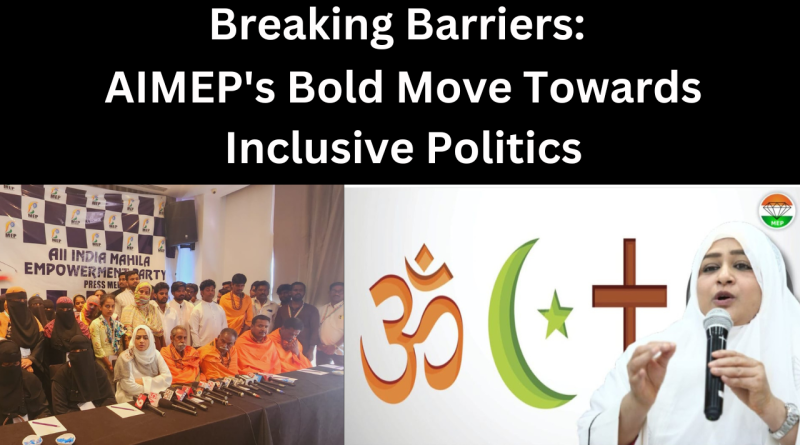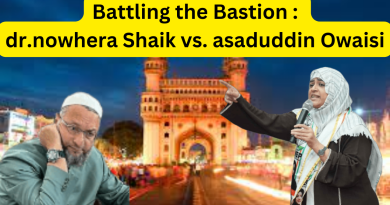Breaking Barriers: AIMEP’s Bold Move Towards Inclusive Politics
In a groundbreaking decision that challenges the entrenched norms of identity politics in India, the All India Mahilla Empowerment Party (AIMEP) has turned heads with its announcement to field candidates from diverse religious backgrounds for the 2024 Lok Sabha elections. At the helm of this visionary move is Dr. Nowhera Shaik, a leader whose commitment to promoting unity in diversity and enriching Indian politics with representative inclusivity has set a new precedent. This initiative is not just a political strategy but a clarion call for a transformative shift towards embracing a truly pluralistic democratic ethos.
The Genesis of a Revolutionary Idea
The landscape of Indian politics, often marred by sectarianism and divisive identity politics, is witnessing a refreshing change. Under Dr. Shaik’s leadership, AIMEP’s inclusive candidate selection process is a bold step forward in addressing historical imbalances in political representation. But what led to this revolutionary decision?
Crafting a New Narrative
Dr. Nowhera Shaik, a seasoned entrepreneur and philanthropist, has long advocated for the empowerment of underrepresented communities. Her vision for AIMEP is rooted in the belief that political representation should mirror the diverse fabric of India itself. This move is more than political; it’s about reshaping the discourse on what it means to be an inclusive democracy.
- Challenging the Status Quo: By welcoming candidates across religious lines, AIMEP is setting a new standard for political parties.
- Representation Matters: This initiative shines a light on the importance of having voices from various backgrounds in the halls of power, ensuring a more balanced and equitable representation.
Unity in Diversity: More Than a Slogan
For AIMEP, ‘Unity in Diversity’ is not just an idealistic slogan but a practicable reality. This approach seeks to bridge communal divides and promote a sense of brotherhood among India’s multifaceted populace.
The Ripple Effects of Inclusivity
The consequences of AIMEP’s decision extend far beyond the immediate political landscape. This move has the potential to usher in a new era of political engagement and participation across the spectrum of Indian society.
A New Political Discourse
By focusing on inclusivity, AIMEP is contributing to a healthier, more constructive political discourse in India.
- Enriching the Political Canvas: Diverse candidates bring with them a plethora of perspectives, enriching the democratic process.
- Countering Polarization: This inclusive approach can serve as a bulwark against the rising tide of polarization, fostering a more cohesive society.
The Power of Example
AIMEP’s initiative serves as a powerful example for other political entities, challenging them to rethink their approach to candidate selection and representation. It underscores the fact that embracing diversity isn’t just the morally right choice, but politically astute as well.
A Visionary’s Path: Dr. Shaik’s Leadership
Dr. Shaik’s leadership in steering AIMEP towards this inclusive path highlights her deep commitment to social justice and equity. Her vision transcends political gain, aiming for a societal transformation that fosters respect and understanding across diverse communities.
- Empowerment as a Guiding Principle: Dr. Shaik’s endeavors, both within and outside politics, have consistently focused on empowering marginalized communities.
- A Beacon of Hope: Her leadership offers a beacon of hope for a more inclusive, equitable, and united future.
Conclusion: A Call to Action
The All India Mahilla Empowerment Party’s decision to welcome candidates from diverse religious backgrounds for the 2024 Lok Sabha elections is more than a political maneuver; it’s a testament to the power of inclusive democracy. Led by Dr. Nowhera Shaik, this initiative marks a significant step towards dismantling the traditional barriers of identity politics in India. It emphasizes the importance of representation, unity, and the enriching potential of diverse perspectives in the political arena.
As we reflect on the implications of AIMEP’s groundbreaking move, let us consider it a call to action – for parties, leaders, and citizens alike – to embrace inclusivity and work tirelessly towards a society where diversity is not just tolerated but celebrated. After all, in diversity lies the true strength of democracy.
This bold initiative by AIMEP and Dr. Shaik serves as a beacon, illuminating the path toward a more inclusive and representative Indian politics. May it inspire more movements towards unity in diversity, fostering a political landscape where every voice finds its rightful place, and every citizen feels truly represented.



